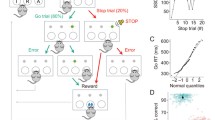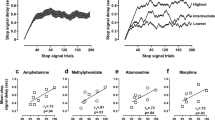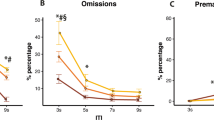Abstract
Rationale
The stop-signal reaction time (SSRT) task measures inhibition of a response that has already been initiated, i.e. the ability to stop. ‘Impulsive’ human subjects, e.g. with attention deficit and hyperactivity disorder (ADHD), have longer SSRTs. Both SSRT and go-trial reaction time (GoRT) may be sensitive to drugs such as d-amphetamine, methylphenidate and modafinil, both in normal subjects and those with ADHD.
Objectives
To investigate the effects of modafinil (3, 10, 30 and 100 mg/kg) and methylphenidate (0.3, 1.0 and 3.0 mg/kg) on SSRT task performance in the rat. To investigate the possible contribution of dopamine receptors in the action of these drugs using the mixed D1/D2 dopamine receptor antagonist cis-flupenthixol.
Results
Modafinil significantly decreased SSRT with little effect on GoRT but only in rats with slow baseline SSRTs. Fast SSRTs were not changed by modafinil. Methylphenidate decreased GoRTs of all rats. However, methylphenidate had baseline-dependent effects on SSRT, decreasing SSRT in slow responders but increasing SSRT in fast responders. Cis-flupenthixol (0.01, 0.04 and 0.125 mg/kg) had no effects on SSRT but increased GoRT at higher doses. At the lowest dose (0.01 mg/kg), cis-flupenthixol failed to disrupt the SSRT-decreasing effects of either modafinil or methylphenidate, whereas at 0.04 mg/kg, the cis-flupenthixol-dependent increase in GoRT was antagonised by methylphenidate but not by modafinil.
Conclusions
This evidence supports a hypothesis that stop and go processes are under control of distinct neurochemical mechanisms.






Similar content being viewed by others
References
Arnsten AF, Dudley AG (2005) Methylphenidate improves prefrontal cortical cognitive function through alpha2 adrenoceptor and dopamine D1 receptor actions: Relevance to therapeutic effects in attention deficit hyperactivity disorder. Behav Brain Funct 1:2
Arnsten AF, Li BM (2005) Neurobiology of executive functions: catecholamine influences on prefrontal cortical functions. Biol Psychiatry 57:1377–1384
Aron AR, Dowson JH, Sahakian BJ, Robbins TW (2003) Methylphenidate improves response inhibition in adults with attention-deficit/hyperactivity disorder. Biol Psychiatry 54:1465–1468
Axelrod J, Mueller RA, Henry JP, Stephens PM (1970) Changes in enzymes involved in the biosynthesis and metabolism of noradrenaline and adrenaline after psychosocial stimulation. Nature 225:1059–1060
Barkley RA (1997) Behavioral inhibition, sustained attention, and executive functions: constructing a unifying theory of ADHD. Psychol Bull 121:65–94
Bastuji H, Jouvet M (1988) Successful treatment of idiopathic hypersomnia and narcolepsy with modafinil. Prog Neuro-psychopharmacol Biol Psychiatry 12:695–700
Bedard AC, Ickowicz A, Logan GD, Hogg-Johnson S, Schachar R, Tannock R (2003) Selective inhibition in children with attention-deficit hyperactivity disorder off and on stimulant medication. J Abnorm Child Psychol 31:315–327
Billiard M, Besset A, Montplaisir J, Laffont F, Goldenberg F, Weill JS, Lubin S (1994) Modafinil: a double-blind multicentric study. Sleep 17:S107–S112
Boonstra AM, Kooij JJ, Oosterlaan J, Sergeant JA, Buitelaar JK (2005) Does methylphenidate improve inhibition and other cognitive abilities in adults with childhood-onset ADHD? J Clin Exp Neuropsychol 27:278–298
Bubser M, Fadel JR, Jackson LL, Meador-Woodruff JH, Jing D, Deutch AY (2005) Dopaminergic regulation of orexin neurons. Eur J Neurosci 21:2993–3001
Buitelaar JK, Van der Gaag RJ, Swaab-Barneveld H, Kuiper M (1995) Prediction of clinical response to methylphenidate in children with attention-deficit hyperactivity disorder. J Am Acad Child Adolesc Psychiatry 34:1025–1032
Cantwell DP (1996) Attention deficit disorder: a review of the past 10 years. J Am Acad Child Adolesc Psychiatry 35:978–987
Cardinal RN, Aitken MRF (2001) Whisker, version 2.2, computer software
Castellanos FX, Sonuga-Barke EJ, Milham MP, Tannock R (2006) Characterizing cognition in ADHD: beyond executive dysfunction. Trends Cogn Sci 10:117–123
Chamberlain SR, Muller U, Blackwell AD, Clark L, Robbins TW, Sahakian BJ (2006) Neurochemical modulation of response inhibition and probabilistic learning in humans. Science 311:861–863
Dagan Y, Doljansky JT (2006) Cognitive performance during sustained wakefulness: a low dose of caffeine is equally effective as modafinil in alleviating the nocturnal decline. Chronobiol Int 23:973–983
DuPaul GJ, Barkley RA, McMurray MB (1994) Response of children with ADHD to methylphenidate: interaction with internalizing symptoms. J Am Acad Child Adolesc Psychiatry 33:894–903
Eagle DM, Robbins TW (2003a) Inhibitory control in rats performing a stop-signal reaction-time task: effects of lesions of the medial striatum and d-amphetamine. Behav Neurosci 117:1302–1317
Eagle DM, Robbins TW (2003b) Lesions of the medial prefrontal cortex or nucleus accumbens core do not impair inhibitory control in rats performing a stop-signal reaction time task. Behav Brain Res 146:131–144
Feola TW, de Wit H, Richards JB (2000) Effects of d-amphetamine and alcohol on a measure of behavioral inhibition in rats. Behav Neurosci 114:838–848
Fillmore MT, Kelly TH, Martin CA (2005) Effects of d-amphetamine in human models of information processing and inhibitory control. Drug Alcohol Depend 77:151–159
Gauntlett-Gilbert J, Brown VJ (1998) Reaction time deficits and Parkinson’s disease. Neurosci Biobehav Rev 22:865–881
Gill M, Haerich P, Westcott K, Godenick KL, Tucker JA (2006) Cognitive performance following modafinil versus placebo in sleep-deprived emergency physicians: a double-blind randomized crossover study. Acad Emerg Med 13:158–165
Hendley ED, Snyder SH, Fauley JJ, LaPidus JB (1972) Stereoselectivity of catecholamine uptake by brain synaptosomes: studies with ephedrine, methylphenidate and phenyl-2-piperidyl carbinol. J Pharmacol Exp Ther 183:103–116
Howell DC (1997) Statistical methods for psychology, 4th edn. Duxbury, Belmont
Ishizuka T, Sakamoto Y, Sakurai T, Yamatodani A (2003) Modafinil increases histamine release in the anterior hypothalamus of rats. Neurosci Lett 339:143–146
Krause J, la Fougere C, Krause KH, Ackenheil M, Dresel SH (2005) Influence of striatal dopamine transporter availability on the response to methylphenidate in adult patients with ADHD. Eur Arch Psychiatry Clin Neurosci 255:428–431
Lalonde R, Botez-Marquard T (1997) The neurobiological basis of movement initiation. Rev Neurosci 8:35–54
Langley K, Marshall L, van den Bree M, Thomas H, Owen M, O’Donovan M, Thapar A (2004) Association of the dopamine D4 receptor gene 7-repeat allele with neuropsychological test performance of children with ADHD. Am J Psychiatry 161:133–138
Lijffijt M, Kenemans JL, Wal AT, Quik EH, Kemner C, Westenberg H, Verbaten MN, Engeland HV (2006) Dose-related effect of methylphenidate on stopping and changing in children with attention-deficit/hyperactivity disorder. Eur Psychiatr 21:544–547
Lin JS, Roussel B, Akaoka H, Fort P, Debilly G, Jouvet M (1992) Role of catecholamines in the modafinil and amphetamine induced wakefulness, a comparative pharmacological study in the cat. Brain Res 591:319–326
Logan GD (1994) On the ability to inhibit thought and action. A users’ guide to the stop signal paradigm. In: Dagenbach D, Carr TH (eds) Inhibitory processes in attention, memory and language. Academic, San Diego, CA, pp 189–236
Logan GD, Cowan WB (1984) On the ability to inhibit thought and action—a theory of an act of control. Psychol Rev 91:295–327
Overtoom CC, Verbaten MN, Kemner C, Kenemans JL, van Engeland H, Buitelaar JK, van der Molen MW, van der Gugten J, Westenberg H, Maes RA, Koelega HS (2003) Effects of methylphenidate, desipramine, and l-dopa on attention and inhibition in children with attention deficit hyperactivity disorder. Behav Brain Res 145:7–15
Pliszka SR (1989) Effect of anxiety on cognition, behavior, and stimulant response in ADHD. J Am Acad Child Adolesc Psychiatry 28:882–887
Randall DC, Shneerson JM, Plaha KK, File SE (2003) Modafinil affects mood, but not cognitive function, in healthy young volunteers. Hum Psychopharmacol 18:163–173
Rapport MD, DuPaul GJ, Stoner G, Birmingham BK, Masse G (1985a) Attention deficit disorder with hyperactivity: differential effects of methylphenidate on impulsivity. Pediatrics 76:938–943
Rapport MD, Stoner G, DuPaul GJ, Birmingham BK, Tucker S (1985b) Methylphenidate in hyperactive children: differential effects of dose on academic, learning, and social behavior. J Abnorm Child Psychol 13:227–243
Robbins TW (2002) The 5-choice serial reaction time task: behavioural pharmacology and functional neurochemistry. Psychopharmacology (Berl) 163:362–380
Robinson ESJ, Eagle DM, Banerjee G, Jiang X, Robbins TW (2006) Effects of atomoxetine on inhibitory control in the rat stop signal task. J Psychopharmacol 20:A67
Ross SB (1978) Antagonism by methylphenidate of the stereotyped behaviour produced by (+)-amphetamine in reserpinized rats. J Pharm Pharmacol 30:253–254
Rugino TA, Copley TC (2001) Effects of modafinil in children with attention-deficit/hyperactivity disorder: an open-label study. J Am Acad Child Adolesc Psychiatry 40:230–235
Rugino TA, Samsock TC (2003) Modafinil in children with attention-deficit hyperactivity disorder. Pediatr Neurol 29:136–142
Scheres A, Oosterlaan J, Swanson J, Morein-Zamir S, Meiran N, Schut H, Vlasveld L, Sergeant JA (2003) The effect of methylphenidate on three forms of response inhibition in boys with AD/HD. J Abnorm Child Psychol 31:105–120
Schweitzer JB, Lee DO, Hanford RB, Tagamets MA, Hoffman JM, Grafton ST, Kilts CD (2003) A positron emission tomography study of methylphenidate in adults with ADHD: alterations in resting blood flow and predicting treatment response. Neuropsychopharmacology 28:967–973
Semrud-Clikeman M, Filipek PA, Biederman J, Steingard R, Kennedy D, Renshaw P, Bekken K (1994) Attention-deficit hyperactivity disorder: magnetic resonance imaging morphometric analysis of the corpus callosum. J Am Acad Child Adolesc Psychiatry 33:875–881
Sunohara GA, Voros JG, Malone MA, Taylor MJ (1997) Effects of methylphenidate in children with attention deficit hyperactivity disorder: a comparison of event-related potentials between medication responders and non-responders. Int J Psychophysiol 27:9–14
Sunohara GA, Malone MA, Rovet J, Humphries T, Roberts W, Taylor MJ (1999) Effect of methylphenidate on attention in children with attention deficit hyperactivity disorder (ADHD): ERP evidence. Neuropsychopharmacology 21:218–228
Szabadi E (2006) Drugs for sleep disorders: mechanisms and therapeutic prospects. Br J Clin Pharmacol 61:761–766
Tanganelli S, Perez de la Mora M, Ferraro L, Mendez-Franco J, Beani L, Rambert FA, Fuxe K (1995) Modafinil and cortical gamma-aminobutyric acid outflow. Modulation by 5-hydroxytryptamine neurotoxins. Eur J Pharmacol 273:63–71
Tannock R, Schachar RJ, Carr RP, Chajczyk D, Logan GD (1989) Effects of methylphenidate on inhibitory control in hyperactive-children. J Abnorm Child Psychol 17:473–491
Tannock R, Ickowicz A, Schachar R (1995) Differential effects of methylphenidate on working memory in ADHD children with and without comorbid anxiety. J Am Acad Child Adolesc Psychiatry 34:886–896
Taylor FB, Russo J (2000) Efficacy of modafinil compared to dextroamphetamine for the treatment of attention deficit hyperactivity disorder in adults. J Child Adolesc Psychopharmacol 10:311–320
Taylor E, Schachar R, Thorley G, Wieselberg HM, Everitt B, Rutter M (1987) Which boys respond to stimulant medication? A controlled trial of methylphenidate in boys with disruptive behaviour. Psychol Med 17:121–143
Turner D (2006) A review of the use of modafinil for attention-deficit hyperactivity disorder. Expert Rev Neurother 6:455–468
Turner DC, Robbins TW, Clark L, Aron AR, Dowson J, Sahakian BJ (2003) Cognitive enhancing effects of modafinil in healthy volunteers. Psychopharmacology 165:260–269
Turner DC, Clark L, Dowson J, Robbins TW, Sahakian BJ (2004) Modafinil improves cognition and response inhibition in adult attention-deficit/hyperactivity disorder. Biol Psychiatry 55:1031–1040
van der Meere J, Shalev R, Borger N, Gross-Tsur V (1995) Sustained attention, activation and MPH in ADHD: a research note. J Child Psychol Psychiatry 36:697–703
Volkow ND, Wang G, Fowler JS, Logan J, Gerasimov M, Maynard L, Ding Y, Gatley SJ, Gifford A, Franceschi D (2001) Therapeutic doses of oral methylphenidate significantly increase extracellular dopamine in the human brain. J Neurosci 21:RC121
Ward CP, Harsh JR, York KM, Stewart KL, McCoy JG (2004) Modafinil facilitates performance on a delayed nonmatching to position swim task in rats. Pharmacol Biochem Behav 78:735–741
Waters KA, Burnham KE, O’Connor D, Dawson GR, Dias R (2005) Assessment of modafinil on attentional processes in a five-choice serial reaction time test in the rat. J Psychopharmacol 19:149–158
Zametkin AJ, Borcherding BG (1989) The neuropharmacology of attention-deficit hyperactivity disorder. Annu Rev Med 40:447–451
Acknowledgements
This study was supported by a Wellcome Trust Program Grant awarded to TWR, B. J. Everitt, A. C. Roberts and B. J. Sahakian, and completed within the University of Cambridge Behavioural and Clinical Neuroscience Institute, supported by a joint award from Medical Research Council and the Wellcome Trust. All procedures comply with the current laws of the UK.
Author information
Authors and Affiliations
Corresponding author
Rights and permissions
About this article
Cite this article
Eagle, D.M., Tufft, M.R.A., Goodchild, H.L. et al. Differential effects of modafinil and methylphenidate on stop-signal reaction time task performance in the rat, and interactions with the dopamine receptor antagonist cis-flupenthixol. Psychopharmacology 192, 193–206 (2007). https://doi.org/10.1007/s00213-007-0701-7
Received:
Accepted:
Published:
Issue Date:
DOI: https://doi.org/10.1007/s00213-007-0701-7




